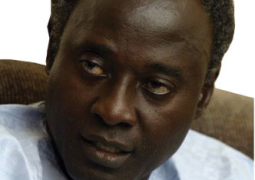This new drive by Japan to attract Africa and bolster her economic and social well-being is really something to write home about, as the support is pegged at 3.2 trillion Japanese Yen (JPY), which is equivalent to US$32 billion.
This laudable project is out to boost the growth of Africa through trade and investment of the private sector; and promote “human security” through Japan’s unique assistance.
“Therefore, Japan will contribute to the growth of Africa, utilizing private and public means of up to approximately JPY 3.2 trillion (equivalent to USD 32 billion), including ODA of approximately JPY 1.4 trillion (equivalent to USD 14 billion), in the next 5 years,” according to a statement on Japan’s Assistance Package for Africa.
The project, initiated in 1993 to benefit a wide range of African countries, including The Gambia, will boost economic growth including private sector development, trade and investment, natural resources;accelerate infrastructure and capacity development including infrastructure, human resource development, science and technology, and tourism; empower farmers as mainstream economic actors including agriculture, food and nutrition security;promote sustainable and resilient growth including environment, climate change, and disaster prevention; create an inclusive society for growth including education and gender, health, water and sanitation; andconsolidate peace, stability, democracy and good governance, counter-terrorism/ counter-piracy measures.
The project, according to the plan, is expected to benefit tens of thousands of African people, especially women and the youth, who will be consistently trained to become the entrepreneurs, engineers, agriculturalists, technology experts, and peacekeepers of their nations across Africa.
However, it should be noted that development progarmmes of this nature have come and gone, and African countries still could not make the most of it, as most countries in sub-Saharan Africa are still technology-poor, investment-redundant and weak in many facets of national security and human development.
To a large extent, this is because when such assistance comes, the focus of our decision makers and development planners is mainly fixed on how they could reap funds and get themselves enriched financially to the detriment of their countries’ socio-economic development.
We, therefore, hope and pray that the TICAD programme bears fruits for the benefit of African people and nations; that at the meeting in Nairobi, Africans are able to come up with strategic plans to develop the energy, health, security, transport and infrastructure sectors of their nations.
“All that is valuable in human society depends upon the opportunity for development accorded the individual”
Albert Einstein




